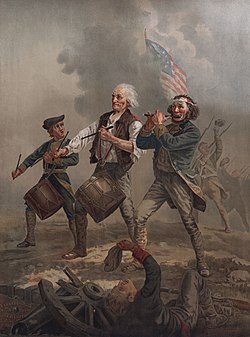洋基歌
| 洋基歌 "Yankee Doodle" | |
|---|---|
 油画《七六年之精神》,又名《洋基傻小子》 | |
| 歌曲 | |
| 语言 | 英语 |
| 出版 | 1780年代 |
《洋基歌》(Yankee Doodle),全称《洋基傻子歌》,是一首美国传统歌曲,其起源可追溯至美国七年战争时期。今天这首歌在美国通常被当作爱国歌曲,它同时还是康涅狄格州的州歌[1]。
这首歌的真正源头仍不清楚[2]。常见的说法认为这首歌是在美国独立战争以前英军用以嘲笑殖民地居民粗俗的衣着和举止的,而“洋基”(Yankee)一词是对参加法印战争的新英格兰人的轻蔑之词,后指代美国英格兰地区的人,甚至是全体美国人,Doodle这里的意思是“傻子”,也是英军对殖民地居民的嘲讽。这首歌的曲调很可能来自与儿歌《露茜的钱袋》(Lucy Locket),其中一个版本的歌词可能来自于一名英国外科医生理查德·沙克伯勒(Richard Shuckburgh)[3]。虽然这首歌的歌词带有贬义,然而独立战争期间美军却采用《洋基歌》作为他们自己的歌以反讽敌军,表明他们对自己朴素的家纺衣着和毫不矫揉造作的举止感到自豪。洋基歌的歌词有许多不同版本。多年来,这首歌在美国一直被当作非正式的国歌,也是最受欢迎的儿歌。在各类电影,电视和动画片中时常能听见这首歌曲。

歌词
[编辑]今天洋基歌最常见版本的第一段歌词如下:
| (英文原词) | (中文意译) |
|---|---|
|
|
|
Doodle这个词最早出现在17世纪初[4],可能源于低地德语的dudel或dödel,意思是“蠢人”或“傻瓜”。而macaroni(“通心粉”)指的是一种流行于1770年代的假发,在同时期也成了对赶时髦人士的蔑称[5]。第一段歌词可能暗示着美国人(洋基佬)没见过世面,以为在头上插根羽毛就算时尚了[6]。

早期版本
[编辑]最早版本的歌词大约形成在1755年或1758年,具体时间还存有争议[7]:
| (英文原词) | (中文意译) |
|---|---|
|
|
|
其中的埃夫莱姆影射的是战死于乔治湖战役的马萨诸塞州陆军上校埃夫莱姆·威廉姆斯(Ephraim Williams)。
英国人经常与某个版本的歌词联系上,此版本歌词与一个名为托马斯·迪特森的马萨诸塞州比勒瑞卡镇人有关。迪特森在1775年3月在波士顿因为试图购买滑膛枪而被英国人涂柏油、粘羽毛:
| (英文原词) | (中文意译) |
|---|---|
|
|
|
也正因为这首歌,比勒瑞卡镇宣称它是洋基歌中傻小子的“故乡”[8][9],同时认为正是从此开始,美国人把这首本来是用以嘲笑他们的歌拿来嘲笑英国人。在列克星敦和康科德战役之后,一家波士顿报纸作了如下报导: “在被民兵赶回波士顿以后,一个英国人问他的军官兄弟对这首歌有什么看法,——‘去他的,’他回答道,‘他们逼着我们就着这歌跳舞,直到跳不动了为止。’——从那以后他们就不再喜欢这首歌了。”
邦克山战役之后,英国人又作了一组歌词:
| (英文原词) | (中文意译) |
|---|---|
|
|
|
1788年2月6日,马萨诸塞州议会在布拉特尔街礼拜堂以186票对168票通过了美国宪法。为了表示庆祝,一个新版本的歌词又开始传唱[10],以下是歌词节选:
| (英文原词) | (中文意译) |
|---|---|
|
|
|
完整版本
[编辑]今天大家熟知的完整版本歌词如下[11]:
- Yankee Doodle went to town
- A-riding on a pony,
- Stuck a feather in his cap
- And called it macaroni'.
- Chorus:
- Yankee Doodle keep it up,
- Yankee Doodle dandy,
- Mind the music and the step,
- And with the girls be handy.
- Fath'r and I went down to camp,
- Along with Captain Gooding,
- And there we saw the men and boys
- As thick as hasty puddin'.
- Chorus
- And there we saw a thousand men
- As rich as Squire David,
- And what they wasted every day,
- I wish it could be saved.
- Chorus
- The 'lasses they eat it every day,
- Would keep a house a winter;
- They have so much, that I'll be bound,
- They eat it when they've mind ter.
- Chorus
- And there I see a swamping gun
- Large as a log of maple,
- Upon a deuced little cart,
- A load for father's cattle.
- Chorus
- And every time they shoot it off,
- It takes a horn of powder,
- and makes a noise like father's gun,
- Only a nation louder.
- Chorus
- I went as nigh to one myself
- As 'Siah's inderpinning;
- And father went as nigh again,
- I thought the deuce was in him.
- Chorus
- Cousin Simon grew so bold,
- I thought he would have cocked it;
- It scared me so I shrinked it off
- And hung by father's pocket.
- Chorus
- And Cap'n Davis had a gun,
- He kind of clapt his hand on't
- And stuck a crooked stabbing iron
- Upon the little end on't
- Chorus
- And there I see a pumpkin shell
- As big as mother's bason,
- And every time they touched it off
- They scampered like the nation.
- Chorus
- I see a little barrel too,
- The heads were made of leather;
- They knocked on it with little clubs
- And called the folks together.
- Chorus
- And there was Cap'n Washington,
- And gentle folks about him;
- They say he's grown so 'tarnal proud
- He will not ride without em'.
- Chorus
- He got him on his meeting clothes,
- Upon a slapping stallion;
- He sat the world along in rows,
- In hundreds and in millions.
- Chorus
- The flaming ribbons in his hat,
- They looked so tearing fine, ah,
- I wanted dreadfully to get
- To give to my Jemima.
- Chorus
- I see another snarl of men
- A digging graves they told me,
- So 'tarnal long, so 'tarnal deep,
- They 'tended they should hold me.
- Chorus
- It scared me so, I hooked it off,
- Nor stopped, as I remember,
- Nor turned about till I got home,
- Locked up in mother's chamber.
- Chorus
变奏与戏仿版本
[编辑]洋基歌拥有许多变奏与戏仿版本,包括以下这个今天最常见的版本[12]:
| (英文原词) | (中文意译) |
|---|---|
|
|
|
文化影响
[编辑]- 台湾歌手柳翰雅的《锉冰进行曲》,其主旋律即是来自《洋基歌》。
- 美国之音的广播节目总以《洋基歌》开头和结束[13]。
- 詹姆斯·卡格尼主演的1942年电影《胜利之歌》主题曲即是《洋基歌》。
- 日本歌曲《阿尔卑斯一万尺》的旋律即来自《洋基歌》。
- 美国儿童节目《巴尼与朋友》主题曲《巴尼是一只恐龙》旋律来自《洋基歌》,并进行填词改编。
- 小红书和龙牡壮骨颗粒于2019年推出的电视广告,其背景音乐均以《洋基歌》为旋律进行了填词改编。
- 猫和老鼠中有一部短片《洋基傻子鼠》(Yankee Doodle Mouse),即和此歌形成一个双关。
- 香港词曲作家卢永亨填词的《神创造世界》旋律改编自《洋基歌》。
- 华语儿歌《农夫》。
参考资料
[编辑]- ^ STATE OF CONNECTICUT, Sites º Seals º Symbols (页面存档备份,存于互联网档案馆); Connecticut State Register & Manual; retrieved on May 23, 2008
- ^ Sonneck, Oscar George Theodore. Report on The Star-spangled Banner, Hail Columbia, America, Yankee Doodle. New York, Dover Publications [1972]. 1972. ISBN 0-486-22237-3.
- ^ A. Lomax, John; Lomax, Alan. American ballads and folk songs. New York: Dover. 1994: 521 [2010-04-12]. ISBN 978-0-486-28276-3. (原始内容存档于2014-07-07).
- ^ "doodle", n, Oxford English Dictionary. Accessed April 29th, 2009.
- ^ J. Woodforde, The Strange Story of False Hair (London: Taylor & Francis, 1971), p. 40.
- ^ R. Ross, Clothing: a global history : or, The Imperialists' new clothes (Polity, 2008), p. 51.
- ^ Carola, Chris. Wish "Yankee Doodle" a happy 250th birthday. Maybe.. Associated Press. 2008-07-05 [2009-09-10]. (原始内容存档于2011-06-29).
- ^ The Billerica Colonial Minute Men (页面存档备份,存于互联网档案馆); The Thomas Ditson story; retrieved on July 10, 2008
- ^ 存档副本. [2009-06-26]. (原始内容存档于2009-06-26).; Town History and Genealogy; retrieved on October 20, 2008
- ^ [1] (页面存档备份,存于互联网档案馆); Philadelphia Commentaries on the Boston Procession
- ^ Gen. George P. Morris - "Original Yankee Words", The Patriotic Anthology, Doubleday, Doran & Company, Inc. publishers, 1941. Introduction by Carl Van Doren. Literary Guild of America, Inc., New York N.Y.
- ^ 19 April 2008. Yankee Doodle (Lyrics). YouTube. 2008-04-19 [2009-09-10]. (原始内容存档于2020-12-20).
- ^ Berg, Jerome S. On the Short Waves, 1923-1945: Broadcast Listening in the Pioneer Days of Radio. 1999, McFarland. ISBN 978-0-7864-0506-0, page 104

